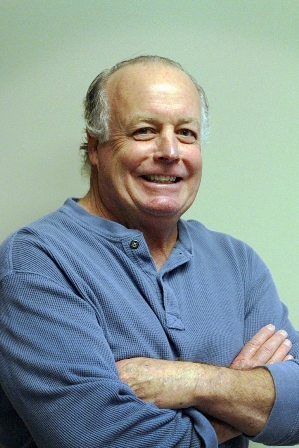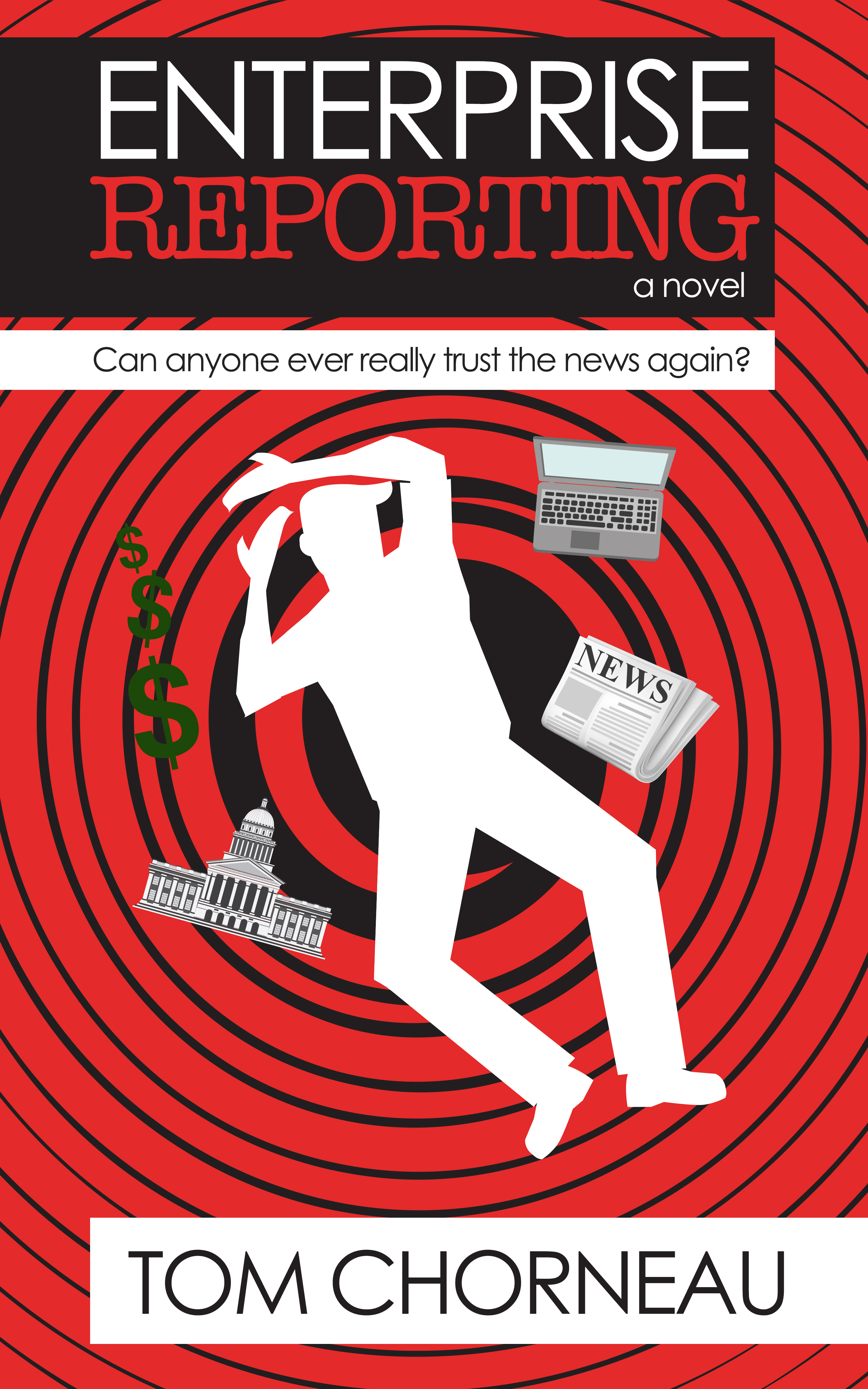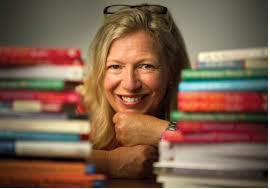 Unless you’ve been living in a cave for the last two years you are probably very familiar with the term “fake news.” But while it primarily wormed its way into the American lexicon during the 2016 presidential election, the challenge of how to discern legitimate news from agenda-driven faux news stories has been around for a long time. Long enough, in fact, that noted Sacramento capitol reporter Tom Chorneau was already well into his debut novel, “Enterprise Reporting,” before most people had ever heard the term. We sat down with him recently to talk about the book, the pros and cons of indie publishing and how a reporter used to daily deadlines deals with the long haul of writing a novel.
Unless you’ve been living in a cave for the last two years you are probably very familiar with the term “fake news.” But while it primarily wormed its way into the American lexicon during the 2016 presidential election, the challenge of how to discern legitimate news from agenda-driven faux news stories has been around for a long time. Long enough, in fact, that noted Sacramento capitol reporter Tom Chorneau was already well into his debut novel, “Enterprise Reporting,” before most people had ever heard the term. We sat down with him recently to talk about the book, the pros and cons of indie publishing and how a reporter used to daily deadlines deals with the long haul of writing a novel.
Open Mic: Is this your first book?
Chorneau: Yes
Open Mic: Have you covered strictly politics for most of your career?
Chorneau: No. I worked in L.A. and Santa Rosa for a number of years and I really didn’t start covering broad, statewide politics until I got to Sacramento at the Associated Press.
Open Mic: What was the impetus for doing this project?
Chorneau: I have had at different points in my life experimented with fiction. I’ve always thought of fiction as being the top of the food chain in terms of writing. And it was always kind of elusive. I didn’t have the discipline, I probably didn’t have the skill and I definitely didn’t have the time. I was raising a family and what not. So truth be told when I did this I was coming out of a thirty year marriage and I suddenly found myself with like a billion hours that I did not want to spend sitting on a barstool. I mean it’s actually extraordinary the amount of time you spend looking at curtains and going to farmer’s markets or whatever it is you do with your wife, and now I had to fill those hours. And so I found myself thinking ‘let’s sit down and do something.’ I’ve done poetry and some short stories so I went back into that and started thinking about something better. The big hurdle for me in doing fiction was that you essentially suspend gravity. Your canvas becomes the world, the universe that you know. If you want to have a fire-breathing dragon that lives on top of the Capitol, you can do it, right? You just have to be able to manipulate things so that it makes some sense and that the reader follows that this is possible, right? Well that’s a really hard thing to do. You can really find yourself down in some dark corners and not knowing what you’re doing if there isn’t something holding you to things that are real. And so the idea was to come up with something that had the sort of a configuration that would hold the discipline I have as a journalist to follow through with what is real, and yet still be able to let a creative thing flow through. The mantra is always “write about what you know” and the recall was something I lived with every day and thought about all day long, and all night long sometimes. And I just found myself trying to find a way to link the two and that’s how it got there. I think of it sometimes as a sculptor. You start with this big block and you start to refine it more and more until you’ve got something where you can kind of see the story if that makes sense.
Open Mic: This self-published, correct?
Chorneau: Yes
Open Mic: There’s certainly many good reasons to go independent rather than legacy publishing, but there are also major drawbacks. What was your thinking when you decided to do it this way?
Chorneau: My experience with fiction is this: on Sunday morning what you worked on all day Saturday and thought was brilliant you will now think is garbage and throw it away and won’t work on it again for months and months. But with this when I got rolling to the point where I thought I had a full expression, I wanted to sell it. I thought I could get the publishing industry interested and I sent out queries to dozens of agencies. I did everything I could think of, but I didn’t get the interest. So it was just a matter of default that it became a self-published. It’s like running a marathon. You have this first draft where you know there’s a bunch of stuff that needs to be fixed and a bunch of things that need to be written, but getting through it once is a big milestone. After that it’s a question of can you go back in and fix all the things you know went wrong? And then you’ve got to show it to somebody to see if it has any validity, so I picked out a handful of people to show it to. It wasn’t like I thought I had the next John Grisham novel on my keyboard. It was more a matter of wanting to see if I could paint the canvas out, get the full pallet and get all the paint and get all the figures and finish what I started. And now I’m going to market the thing, for crying out loud. I’m not going to let it just die. So it’s a matter of pushing through whatever piece of the work that’s left to do.
Open Mic: Everyone in this business has a story of someone with a garage full of books that they couldn’t sell because marketing is hard. But it’s not like that anymore. Now we have print on demand and many more ways to help you market a product. Even so, it’s still daunting. What’s been your approach to the marketing? Did you have a plan or is it just seat of the pants?
Chorneau: I met this women as part of my experience as a 61-year-old guy now dating, and she had what I thought was this brilliant enterprise. She called herself an internet publicist who worked with authors, and she had this scheme where she set people up with websites, big websites, some of them, and they would essentially run thought pieces off their work. All of her clients, though, were kind of self-help people, psychologists or parenting or health-type stuff, and so I asked her if she had ever worked with a novelist. Well, I think she lied. Anyway, I hired her, thinking that’s all I’ve got to do, this women is going to get me online and it’s going to be easy and once people see this thing there’ll be no question. I’ll get a call from a big publisher and it’s going to be good. And of course her deal just didn’t work. I spent a lot of time on it before coming to the conclusion that, just like everything else, I’m going to have to do it myself. So no, no plan, just seat of the pants.
Open Mic: Many authors market by making something free or maybe just 99 cents for a limited time. Have you gone that route? 
Chorneau: Yes, and I’ve also got ads floating around in different places. I’ve experimented with paying for reviews, but some of those deals are kind of a scam, I think. You know, it’s just not easy. I actually started working on a screenplay out of this thinking that was what I needed to do, thinking that if I could just get the right person to read this thing, but I gave it up. I’m a writer, not a screenwriter. So what I’m doing instead is working on another project.
Open Mic: Are you writing a follow up so you can maybe bundle them together?
Chorneau: No. This was kind of a one off. My theme is about fake news, right? But it didn’t come about as a result of reading the New York Times during the presidential election. I was actually in a deep second draft of this thing the first time I saw the term “fake news” in the mainstream press. In fact, if that whole phenomenon not happened I may have stopped with this whole project. But the fact it was in the news the way it was I thought there was an obvious commercial application and that I had to follow it through. I don’t know of any other fiction that’s expressing this kind of theme, right? But I’m looking at a real different approach to storytelling in what I’m working on now. This is a story I wrote and it’s done and I’m proud of it, but I’m ready to move on.
Open Mic: Most reporters are used to working quickly and in chaos but that’s a whole different kind of writing than someone who’s trying to do fiction. What kind of environment do you set up for yourself to write in now?
Chorneau: I talked about the sculpting metaphor, and I think once you got to a place where you can see an image is coming into focus you feel very attached to the place you’re in. And the time that happened to me on this project I was living in Amador County. I had this cool cottage and it had this upstairs loft and everything about it became important to the process. To look out the window and see the cows and the pasture was this really pleasant kind of pastoral theme, and then in the middle of this thing we cut a deal on the house. Now I’m coming back to Orangevale, back to the place where our kids grew up and I was troubled for a bit. Could I translate the energy and security I felt where I was at before to a desk in that setting? But it didn’t take but a minute or two for me to feel the energy of what I was doing before, and that’s the same thing now. I’ll steal time at work at the end of the day when everything is done. I think the ability to concentrate and block out your neighbors in the newsroom that are raising hell and arguing and telling jokes or whatever is really good because I think I can concentrate on what I know I need to. And so I don’t feel like there’s some sort of magic with where I do it or how I do it. I think it’s a matter of being very committed to what you’re doing and having a sense of what you want to do next and how does the story develop in your mind. What is your goal today?
Open Mic: Do you have a daily goal?
Chorneau: No because it’s sort of erratic when I have time but typically on the weekends, Saturday is a big day for me and yeah I’ve got music going, I listen to a classical station, I’m a big classical guy.
Open Mic: do you see yourself joining a writer’s group? You know like a critique group where you help each other with you
Chorneau: I’m a little afraid of that.
Open Mic: I will tell you from experience that I’ve been in good ones and I’ve been in ones that didn’t work out as well. A really good one is really helpful and a bad fit is as unhelpful as it gets. And for me there’s never been any in between.
Chorneau: I will say this wouldn’t have happened had this one good friend of mine not served as kind of the editor and the sounding board. At different points there were three or four other people I respected that did give me good feedback and were important to urging me on, often by telling me that this is no good and you need to up your game.
Open Mic: Are you happy enough with how this worked out that you’re going to make indie publishing your focal point going forward or are you still harboring the desire to get into legacy publishing?
Chorneau: Oh yeah I think so. You want your work to be read, you know? If you’re at the Daily News in L.A. you wish you were at the Times, and not just because it’s a better paper but because it’s bigger. Maybe if you’re at the Santa Rosa Press Democrat you wish you were at the San Francisco Chronicle, I don’t know. I think it’s natural. I think for most healthy ego writer types it’s important to want your work read. That said, at this stage of my life it’s about the work. I grew up at the beach. I was a surfer and spent a lot of time in the ocean. My older brother got Surfer Magazine, and there was a story in there once about these guys who had come in for a big contest going down on Huntington Beach, but the surf was terrible that day. But while this was happening there was some sort of ocean event that caused really good waves to be coming in up in Ventura way north. And so there was a group of guys who heard about this swell on the Friday night before the first heat on Saturday, and they said fuck it let’s go up to Point Dume. They surfed all day and had this wonderful time and then went back to see what was going on in the contest. The guy who had won asked them why they didn’t stay for the contest and their response – and this quote that has always stuck with me – was “hey, it’s about the waves.” It wasn’t about who’s here watching or the accolades of getting a trophy or, in this case, the number of people who might read your book and end up going to a movie based on your book. It’s about the work! That’s really what it’s about. Whether I got on the front page with something or whether the editor spiked it or whatever happened, I always felt like I did the work and I always felt good about my commitment to it.
Open Mic: I always like to end on a kind of a silly little question, something kind of fun. Let’s presume I have the ability to put you in a room with any one of the following three people: Dick Dale, Laird Hamilton or Brian Wilson. Which one would you pick and why?
Chorneau: I would say Dick Dale. The surf music, man, that’s our world. I remember many, many Saturday nights with that sound. I still have on my playlist the soundtrack from the surf film “Five Summer Stories,” with the band Honk. I dig that stuff so I would definitely go with Dick Dale.



